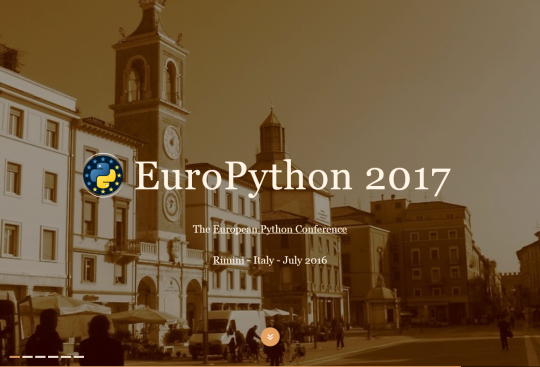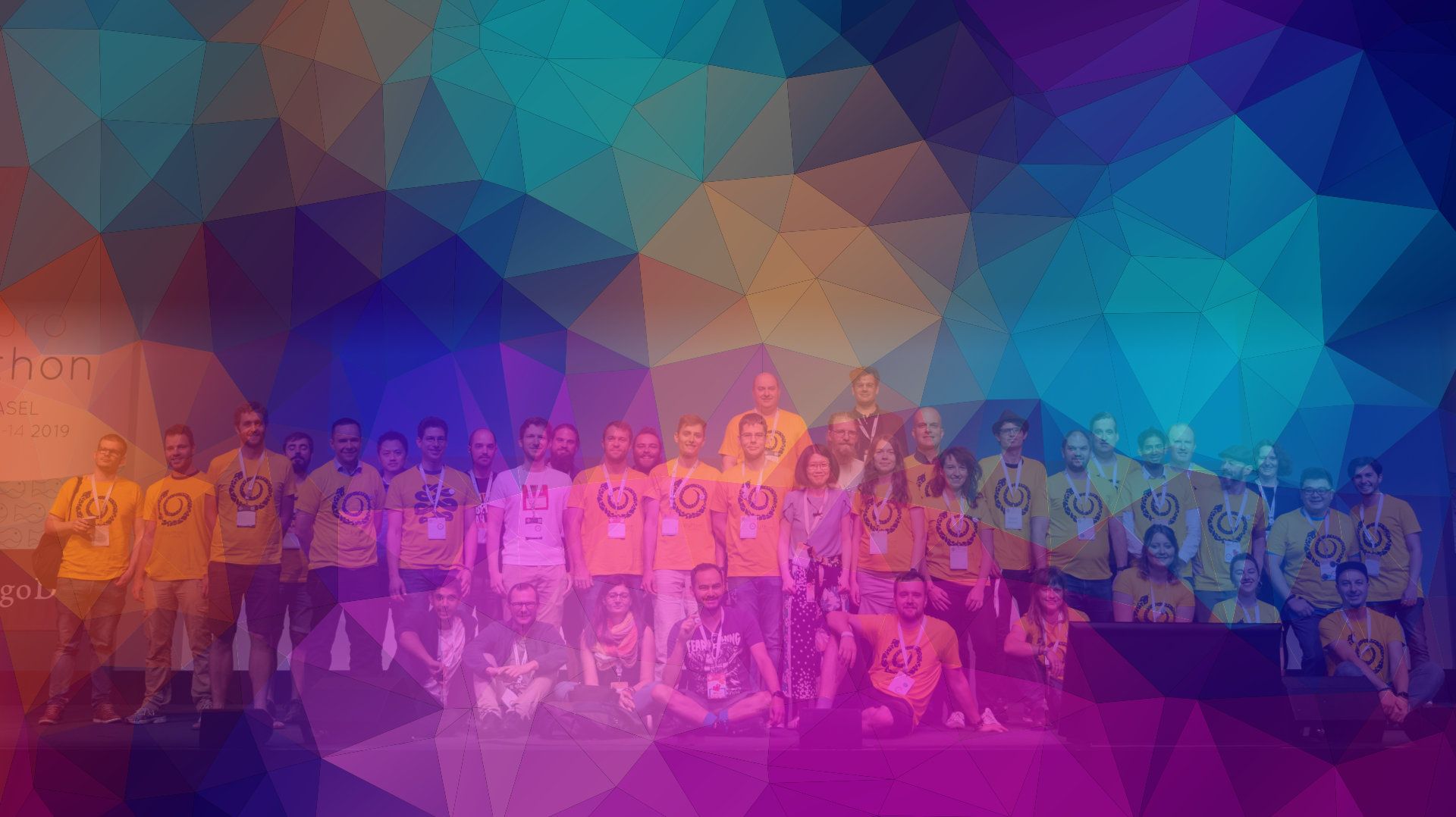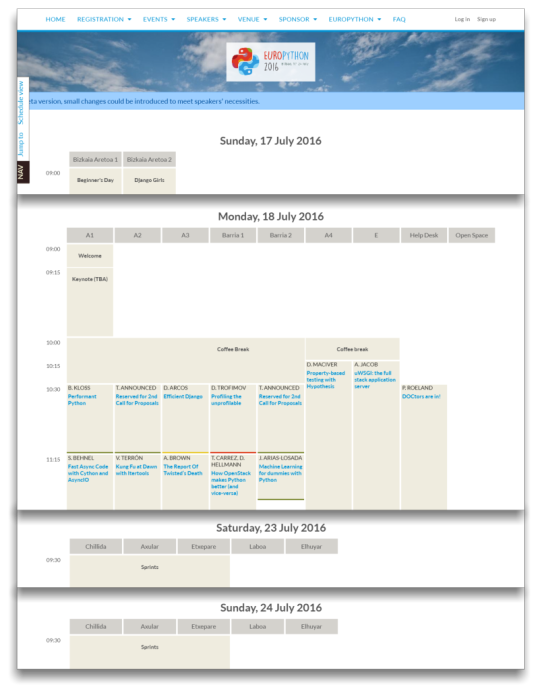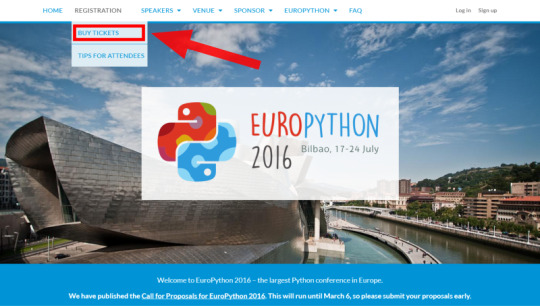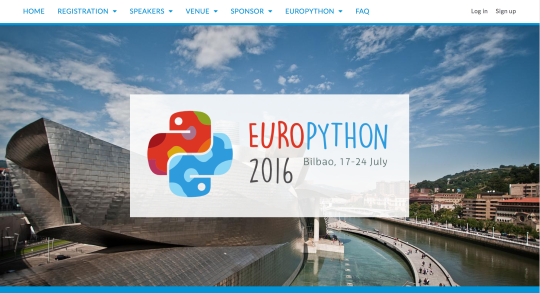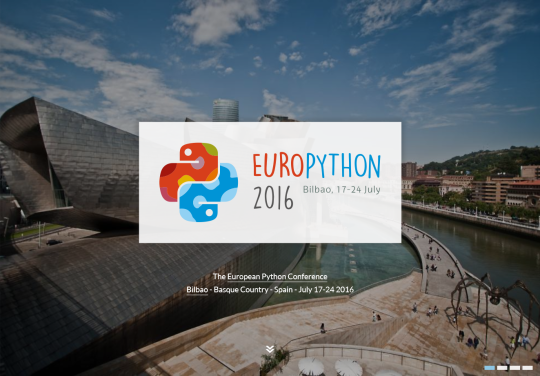At this year’s General Assembly we will vote in a new board of the EuroPython Society.
List of Board Candidates
The EPS bylaws
require one chair and 2 - 6 board members. The following candidates have stated their willingness to work on the EPS board. We are presenting them here (in alphabetical order).
Borja Ayerdi
PhD Student / Co-Founder and CEO of Neurita / Treasurer
Borja
is a PhD student in the University of the Basque Country. He has a
degree in Information Engineering of the same university. His PhD thesis
is focused in several areas of machine learning applications to image
processing, including aortic and brain imaging as well as hyperspectral
satellite imaging. He uses Python for his research projects.
He
is a co-founder and the treasurer of the non-profit Python San
Sebastian society (ACPySS). With the local community he is co-organizer
of Python San Sebastian Conference Series. He is member of the
EuroPython 2015 and 2016 core organization team. He loves the social interaction
and the community.
Christian Calogero Barra
Curious / Traveler / Pythonista / Student of Statistics @UNIPD
From 2015 he is a member of the EuroPython Organisers, chair of the Web
workgroup and a member of the Program and Support workgroup.
He is a Free Software enthusiasm and he would like to teach Python to
european kids.
Until 2014 he had a company in the renewable energy sector, company founded in 2009.
He is also a member of PyCon Italia Organisers and Python Italia
Association and plans to join other Python Communities in Europe.
Currently is studying Statistics at the University of Padua, with a focus
on big data and technology applications.
When he is not having fun with his computer he likes to enjoy Travels, the
Nature, sports and books.
Oier Echaniz Beneitez
PhD Student / Consultant / Chair of ACPySS
Oier
currently is a PhD Student in the University of the Basque Country. He
has a degree in Information Engineering from the same university. His
PhD is focused in medical imaging, cancer diagnosis and machine
learning. He uses Python in his daily programming projects. He is also
co-founder and chair of the Python San Sebastian society (ACPySS), a
non-profit organization involved in the use of Python, Free Software and
Technology in business and education. With the local community he
co-organized a Software Carpentry and is co-organizer in the Python San
Sebastian conference series. He is member of the EuroPython 2015 and 2016 core organization
team.
In
his leisure time he helps as an IT expert in a non-profit organization
called ASPANOGI. This organization takes care of children with cancer,
teaching them computer science and providing them tools and machines
where they can play during hospitalization.
Joaquin Berenguer
PhD / Consultant / Software Engineering Manager
Joaquin is Director at Berentec, a Professional Services Company.
He has a MS in Telecommunication at University of Madrid, and MS in
Robotics at University of Alicante, Services Manager at Sybase during 19
years.
Python is my favorite Language, and EPS gives the opportunity to be engaged
in the future of this Language.
Dr. Darya Chyzhyk
PhD / Python programming enthusiastic for research and science
Currently, Darya is a Post-Doc at the University of Florida, USA. She has a
degree in applied mathematics and defended her thesis in computer science.
Last 7 years Darya has been working on computer aided diagnostic computer
systems for brain diseases at the University of the Basque Country, Spain
and she is a member of of the Computational Intelligence Group since 2009.
Her aim is to develop computational methods for brain MRI processing and
analysis, including open sours tools, that help to the medical people in
their specific pathologies research studies.
She has experience in International Conference organization and take part
in the events for the teenagers and kids such as Week of science.
Participant in more than 10 international science conference, trainings and
summer courses.
Board member of Python San Sebastian Society (ACPySS) and on-site team of
EuroPython 2015 and 2016.
Alexander Hendorf
Pythonista / CTO / Speaker / Data-Nerd
As Chief Information Officer of German management consultancy Königsweg, Alexander is guiding enterprises and institutions through change processes of digitalization and automation.
Alexander always loved data almost as much as music and so no wonder he’s organizer of local meet ups and one of the 25 mongoDB Community Masters.
He loves to share this expertise and engages in the global
community as program chair of the EuroPython conference, speaker and
trainer at multiple international conferences.
Since 2015 he is member of the EuroPython core organization team.
Marc-André Lemburg
Pythonista / CEO / Coach / Consultant
Marc-Andre
is the CEO and founder of eGenix.com, a Python-focused project and
consulting company based in Germany. He has a degree in mathematics from
the University of Düsseldorf. His work with and for Python started in 1994. He became Python Core Developer in 1997, designed and implemented the Unicode support in Python and continued to maintain the Python Unicode implementation for more than a decade. Marc-Andre is a founding member of the Python Software Foundation (PSF) and has served on the PSF Board several times.
In 2002, Marc-Andre was on the executive committee to run the first EuroPython conference in Charleroi, Belgium. He also co-organized the second EuroPython 2003
conference. Since then, he has attended every single EuroPython
conference and continued being involved in the workings of the
conference organization.
In 2012, he was elected as board member of the EuroPython Society
(EPS). He enjoyed the
last few years working with the EPS board members on steering the
EuroPython conference to the new successful EuroPython Workgroup structures to sustain the continued growth,
while maintaining the EuroPython spirit and fun aspect of the
conference.
For the EuroPython 2016 edition, Marc-Andre chaired the EuroPython Admin WG and Communications WG and contributed to several other WGs. He worked on the EuroPython website, signed up new sponsors, setup the conference app, wrote tools for the registration desk, the schedule and the speaker lists. He also setup the pre-launch website back in Nov 2015, helped running the budget and kept an eye on the EPS operations.
Going forward, he would like to broaden the scope of the EPS, aiding Python adoption in Europe, enable it to provide full financial backing of the conference and prepare it for a bright future.
Anthon van der Neut
Consultant / Software Engineering Manager
He has been working with Python on a professional basis since 1998,
after having been introduced to the language a few years earlier while
working in Amsterdam. Since 2007 he maintains the C implementation of OrderedDict
he developed, used by those pythonistas for whom a Pure Python
implementation is not fast enough. He has spoken at and visited PyCon
and visited several EuroPythons after moving back to Europe.
He has managed software development in companies across 3 continents,
primarily oriented at 3D resp. 2D computer graphics and media
management software. This included managing the Commotion development
team, then used at ILM for rotoscoping Star Wars episodes I-III.
He was quaestor on the board of the student society Augustinus
while studying Mathematics, Japanese and Linguistics in Leiden. He was
founding chairman of the Dutch 68000 user group (back in 1984 when that
processor was state-of-the-art) and published about his work on how to
hook up a floating point coprocessor in his Atari ST, as well as on how
to adapt the libraries of Modula-2 to use it.
More recently he has managed the website and member administration of his local karate-club.
When not working on Python, but still at the computer, he can be found answering questions on the Unix & Linux resp. Ebooks StackExchange sites, or refreshing his math skills at Khan Academy where he is one of the few to hold the coveted Tesla badge.
When detached from his keyboard, he can be found cooking for his teenage daughter or practising karate.
He joined the EPS as he likes to work with like minded people in a
multicultural environment promoting his favourite programming language.
Dr. Alexandre Manhaes Savio
Pythonista / PhD / Co-Founder and CTO / Trainer / Spokesperson
Alex has a PhD on machine learning applied to different modalities of
brain MRI for the detection of neurodegeneration and psychiatric
disorders. After that he tried to start a company, but instead
co-founded a local Python society called ACPySS. He was one of the core
organizers of EP2015 and now EP2016.
He currently works as a researcher
in the Nuclear Medicine Department of the university clinic of the
Technical University of Munich in Germany. There he contributes to and
create neuroimaging modules with Python as well as code to improve the
efficiency of the EuroPython organization tasks. He doesn’t know very
well what to do with his life so he is trying to enjoy it for now.
What does the EPS Board do ?
The EPS board runs the day-to-day business of the EuroPython Society.
It is allowed to enter contracts for the society and handle any issues
that have not been otherwise regulated in the bylaws or by the General
Assembly. Most business is handled by email on the board mailing list,
board meetings are usually run as conference calls.
Board members are generally expected to take on leadership roles within the EuroPython Workgroups.
Enjoy,
–
EuroPython Society
